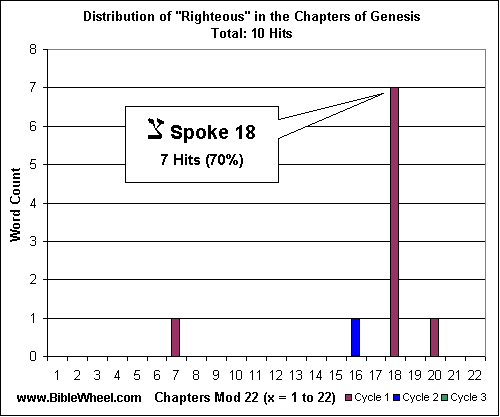


Spoke 18
Ten Righteous?
Genesis 18  Job Job
And the LORD said, Shall I hide from Abraham that thing which I do; Seeing
that Abraham shall surely become a great and mighty nation, and all the nations of the
earth shall be blessed in him? For I know him, that he will command his children
and his household
after him, and they shall keep the way of the LORD, to do justice and judgment; that the
LORD may bring upon Abraham that which he hath spoken of him.
Genesis 18.17f
Genesis 18 exhibits two of the primary symbolic meanings of the eighteenth letter Tsaddi
with extreme clarity. God explains His reason for speaking with Abraham in terms of the Tsaddi KeyWords
Tsavah (Command) and Tsadek (Righteousness), the latter then defining the essence of
their dialog:
And Abraham drew near, and said, Wilt thou also destroy the righteous with the wicked?
Peradventure there be fifty righteous within the city: wilt thou also destroy and not spare the
place for the fifty righteous that are therein? That be far from thee to do after this manner,
to slay the righteous with the wicked: and that the righteous should be as the wicked,
that be far from thee: Shall not the Judge of all the earth do right?
And the LORD said, If I find in Sodom fifty righteous within the city, then I will
spare all the place for their sakes. And Abraham answered and said, Behold now, I have taken upon
me to speak unto the Lord, which am but dust and ashes: Peradventure there shall lack five of the
fifty righteous: wilt thou destroy all the city for lack of five? And he said, If I find there
forty and five, I will not destroy it.
Abraham continues questioning until God promises to save Sodom and Gommorah if He finds a mere ten righteous men.
The significance of this theme of Righteousness found here in Genesis 18 is greatly amplified when we see that
the distribution of the word "righteous" is significantly
maximized in Genesis 18, as shown in the graph below:

It is extremely important to realized what is going on here. The meaning of Tsaddi is thoroughly established
in the alphabetic verses as discussed in the introduction to
Spoke 18. It integrates with the great themes of the books
found thereon as discussed in such articles as Jesus Christ the Righteous (I John), and even plays
a central role in the divine integration of Threads 1 & 2 with the links between Isaiah 40 and
Matthew, as explained in the Inner Wheel article
The Gospel Goes Forth!. Such glory! Yet we have just
begun. The fundamental question asked of God by Abraham -
Wilt thou also destroy the righteous with the wicked? - touches the heart of Book 18, the
Book of Job, as discussed in the article
Righteous Job.
Yet there is still more. Genesis 18 opens with the appearance of "three men" to Abraham:
And the LORD appeared unto him in the plains of Mamre: and he sat in the tent door
in the heat of the day; And he lift up his eyes and looked, and, lo, three men stood by him: and
when he saw them, he ran to meet them from the tent door, and bowed himself toward the ground,
And said, My Lord, if now I have found favour in thy sight, pass not away, I pray thee, from thy servant:
Scripture declares that the Lord (singular) appeared unto Abraham who saw three men
whom he addressed using
the singular "My Lord"! Note that this follows the same pattern seen in the
Great Commision when
Jesus taught us to baptize in the name (singular) of the Father, and of the Son, and of the Holy Spirit.
It is impossible to conclude anything but that these
Three Men are a Theophany - an appearance of God - that is unique in
that it reveals the Holy Trinity! And why is this so utterly astounding? This
Theophany of the Trinity
appears here on Cycle 18 in the structure of Genesis - it integrates with the
threefold witness given
by Almighty God in the Spoke 18 KeyLinks based on 1 John and Matthew - i.e. the divine integration
of the Johannine Comma and the Great Commission, the latter itself being a manifestation of the
fundamental force of Tsaddi as the essence of the command to
Go Forth! There is no end to the
wonder of our God - His ways are higher than the heavens yet are plain and simple and clear as
day to all who have eyes to see! Glory to His Holy Name! Endless Glory! Give Him everlating praise
for the perfection of His Holy Word and His gift to us -
Jesus Christ the Righteous!.
Oh bend the knee to the Righteous Lord!
| 
